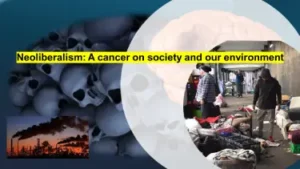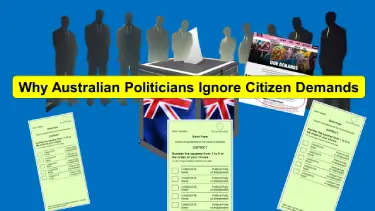Description:
Political apathy in Australia. Explore why Australian politicians ignore citizens’ demands, leading to widespread political apathy and disengagement.
Why Australian Politicians Ignore Citizen Demands: Unravelling Apathy
I. Introduction
A. Overview of the Growing Disconnect
Australia’s democratic foundations are built on the principle that elected representatives should serve the people’s interests. However, a growing number of Australians feel that politicians are ignoring their voices, leading to a deep sense of disillusionment and political apathy. As public demands for essential services and policies continue to be sidelined, citizens increasingly perceive that they have little to no influence over political outcomes, resulting in widespread disengagement from the political process.
B. Purpose of the Article
This article explores the reasons behind the reluctance of Australian politicians to implement policies that align with the desires of the public. It also examines the consequences of this disconnect, including the rise of political apathy, and provides potential solutions to re-engage citizens in the democratic process.
II. The Current Political Landscape in Australia
A. Overview of Public Opinion
Australians have consistently expressed their preferences for policies that address critical issues such as healthcare, climate action, education, and housing.
Polls and surveys reveal strong public support for these issues, yet there is still a significant gap between public opinion and political action.
For instance, a 2021 survey by the Australian Institute found that 75% of Australians support stronger action on climate change, yet governmental policies often fall short of these expectations.
Similarly, there is broad consensus on the need for affordable housing, yet legislative progress has been slow, with many citizens feeling that the housing crisis is not being adequately addressed.
B. Political Response (or Lack Thereof)
Despite clear public preferences, many politicians prioritize corporate interests or party politics over the needs of their constituents.
For example, in the ongoing debate around climate policy, the influence of the fossil fuel industry is evident in the government’s reluctance to commit to ambitious emission reduction targets.
Similarly, the slow progress on housing affordability can be attributed to the powerful real estate and banking lobbies that resist reforms that would impact their profits.
This lack of action on popular policies reflects a broader trend in Australian politics, where decisions are often shaped by a small but powerful group of stakeholders rather than by the majority of citizens.
III. The Impact of Political Disillusionment
A. Voter Apathy and Declining Political Engagement
Political apathy in Australia is reflected in declining voter turnout, especially among younger generations. In the 2022 federal election, voter participation dropped to its lowest level in decades, with many Australians expressing a sense of futility in their vote making any difference.
This disengagement is not just limited to voting; it also manifests in reduced involvement in political discussions, protests, and grassroots movements.
The sense that individual votes and voices do not matter leads to a cycle of apathy, where fewer people participate, further reducing the pressure on politicians to be responsive.
B. Consequences for Democracy
Political apathy poses a significant threat to democracy. When citizens disengage, the accountability mechanisms that keep politicians in check weaken.
This disengagement allows politicians to prioritize special interests without fear of electoral consequences, leading to a government that is increasingly out of touch with the needs of its citizens.
Over time, this erosion of trust can destabilize the social fabric, leading to increased polarization and the rise of populist movements that exploit public disillusionment.
In the long term, sustained political apathy can result in a democracy that no longer functions effectively, where the voices of ordinary citizens are drowned out by the interests of the few.
IV. Understanding the Root Causes
A. The Role of Neoliberalism in Shaping Political Priorities

Neoliberalism, an ideology that emphasizes free markets and limited government intervention, has profoundly influenced Australian politics over the past few decades. This economic philosophy prioritizes corporate interests and fiscal austerity, often at the expense of public welfare.
For example, the privatization of public services, a hallmark of neoliberal policy, has led to a reduction in the quality and accessibility of essential services like healthcare and education.
These policies, while benefiting the private sector, have left many Australians feeling that their needs are secondary to the interests of big business.
As a result, there is growing frustration with a political system that seems more focused on profit than on the well-being of its citizens.
B. The Disconnect Between Politicians and Citizens
The rise of career politicians, many of whom come from privileged backgrounds, has widened the gap between the electorate and their representatives.
These politicians are often more attuned to the needs of their party or corporate donors than to the concerns of ordinary citizens.
For example, issues like housing affordability and climate change are often discussed in terms of economic impact rather than human impact, leading to policies that prioritize financial stability over social equity.
Additionally, the role of the media in shaping public perception cannot be ignored. Media outlets with vested interests may downplay certain issues or misrepresent public opinion, further distorting the democratic process and exacerbating the disconnect between politicians and the public.
V. The Cycle of Powerlessness
A. The Feedback Loop of Apathy
Political inaction leads to voter apathy, which in turn reduces pressure on politicians to act, creating a self-perpetuating cycle.
As citizens feel their voices are unheard, they are less likely to take part in the political process, allowing politicians to continue ignoring public demands without fear of reprisal.
For example, when climate action or housing reforms are stalled, citizens who initially advocated for these changes may become disillusioned and disengage, believing that their efforts are futile.
This disengagement then leads to a lack of public pressure on politicians to prioritize these issues, allowing the status quo to persist.
B. The Role of Social Media and Echo Chambers
Social media platforms have a dual role in political engagement. On one hand, they can amplify citizen voices and mobilize grassroots movements; on the other hand, they often create echo chambers that reinforce existing beliefs and discourage open dialogue.
For example, social media algorithms tend to prioritize content that aligns with users’ pre-existing views, leading to polarized discussions and reducing opportunities for meaningful debate.
Misinformation and polarization thrive in these environments, making it even more challenging for citizens to engage meaningfully in the political process.
This section examines how social media both contributes to and hinders political engagement, emphasizing the importance of critical media literacy and diverse information sources.
VI. Breaking the Cycle: Re-engaging the Citizenry
A. The Importance of Grassroots Movements
Grassroots movements have historically been powerful drivers of political change. In Australia, movements such as the Marriage Equality campaign show how collective action can overcome political inertia.
These movements are often able to achieve what established political parties cannot, by mobilizing public support and applying pressure from the ground up.
For example, the Marriage Equality campaign succeeded where political parties had failed for years, by organizing rallies, petitions, and public debates that kept the issue at the forefront of national conversation.
Grassroots activism offers a model for how citizens can reclaim their power and influence political outcomes, even in the face of widespread apathy.
B. The Role of Education and Public Awareness
Educating the public about the political process and their rights is crucial for re-engaging citizens. This includes not only formal education but also public awareness campaigns that highlight the importance of civic participation.
Programs that teach critical thinking, media literacy, and the importance of voting can empower citizens to make informed decisions and hold politicians accountable.
For instance, initiatives like Vote Compass, which helps Australians align their values with political candidates, have been effective in increasing voter awareness and participation.
Additionally, fostering transparency and accountability in government through tools like open data platforms can help rebuild trust in democratic institutions by making it easier for citizens to see how decisions are made and who is influencing them.
C. Potential Policy Reforms
To enhance citizen participation and make the political process more responsive, several policy reforms could be considered.
These might include the introduction of direct democracy mechanisms, such as citizen-initiated referendums, or the establishment of independent bodies to oversee the implementation of policies that reflect public opinion.
For example, citizen assemblies, where randomly selected citizens deliberate on important issues and make recommendations, have been successfully used in countries like Ireland to resolve contentious issues like abortion.
Additionally, reforms to campaign finance laws and lobbying regulations could help reduce the influence of corporate interests in politics, making it easier for citizen-led initiatives to gain traction and ensuring that political decisions better reflect the will of the people.
VII. Conclusion
A. Summary of Key Points
This article has explored the reasons behind the disconnect between Australian politicians and citizens, the resulting political apathy, and the potential consequences for democracy. By understanding the root causes of this disconnect, including the influence of neoliberalism and the rise of career politicians, we can begin to address the issue of voter disengagement.
B. Call to Action
 It is crucial for citizens to re-engage with the political process to ensure that their voices are heard, and their interests are represented. This can be achieved through participation in grassroots movements, becoming more politically informed, and holding politicians accountable for their actions. By doing so, Australians can help to restore trust in democracy and create a political system that truly reflects the will of the people.
It is crucial for citizens to re-engage with the political process to ensure that their voices are heard, and their interests are represented. This can be achieved through participation in grassroots movements, becoming more politically informed, and holding politicians accountable for their actions. By doing so, Australians can help to restore trust in democracy and create a political system that truly reflects the will of the people.
Summary
In summary, this article has delved into the pressing issue of political apathy in Australia, tracing its roots to a growing disconnect between politicians and citizens. We have explored the detrimental impact of this apathy on democracy and proposed actionable solutions to re-engage the citizenry. By empowering Australians to reclaim their political power, we can work towards a more responsive and inclusive democracy.
Reader Interaction
What do you think is the most effective way to hold Australian politicians accountable? Share your thoughts in the comments below.
Call to Action
If you found this article insightful, subscribe to our newsletter for more in-depth analysis and join the conversation on how we can bring about political change in Australia.
Social Sharing
Share this article on social media and use the hashtags below to spread awareness of the importance of political engagement in Australia: #AussieDemocracy, #PoliticalApathy, #GrassrootsAction, #HoldPoliticiansAccountable


We must acknowledge the concept and existence of the Deep State – that is a pervasive policy framework/paradigm and associated political culture which persists across mainstream party lines, and through time. A classical example is Australia’s alliance with the US which is a shared commitment if not an a priori obligation for the ALP and the LNP which has persisted since WW2, unlike, say, in Aotearoa-New Zealand.
.
The infiltration of US foreign policy, the US military and spy agencies, and the US military-industrial complex into Australian politics, society and the Australian landscape is greater now than at any time since WW2, and continues to expand.
.
We need to push for reforms to our hamstrung version of democracy. The recent inauguration of the National Anti-Corruption Commission (Australia) is a step in the right direction. It was an initiative of the Greens back in 2009 but resisted by both mainstream parties until finally the ALP ran with it and are now seeking to take all the kudos.
.
We need to prohibit all political donations from corporations including military, fossil fuel, pharmaceutical, real estate developers, tobacco, gambling and so on. To justify this, political donations would also have to be prohibited from unions, other organisations, and even individuals. This would be replaced by funding from government according to an equitable formula and set of criteria.
.
Along with a prohibition on political donations we need to include all perks and gifts. The daily routine including meetings attended by political officials should be made transparent and available to the public.
.
The revolving door syndrome must end. Government officials should be prohibited from employment or advisory roles in the private sector (according to a set of criteria) following their retirement from public office. If they need to be financially compensated for this, for example by boosting their pension, then so be it. Similarly, there need to be restrictions on executives in key industries running for public office.
.
Whether intentionally or inadvertently, mainstream media has had the effect of dumbing down the polity and we are fast becoming a society of boguns. To counteract this trend we could place greater emphasis on life-long education and developing purpose-built well-resourced community colleges to encourage people to take short (or long) courses at affordable rates (or free) to help them develop critical thinking skills, and to have a more sophisticated grasp of social issues, history, political economics and world affairs.
.
A move toward a more participatory democracy, as your article highlights, is also key. A Youth Parliament and a Youth Local Council could be a worthwhile initiative.
Hi Geoff,
Thank you for your thoughtful comment. You are probable correct about the “deep state” and the influence of the U.S. and its CIA in Australian politics. It is like a cancer destroying Australia and much of the Western world. I agree that all political and Union donations should be outlawed. These donations have corrupting our political system. As for the new NACC, it has already been compromised and so far does not seem to be doing the job it was intended to do. We also urgently need media laws with teeth to keep our mainstream media in line.